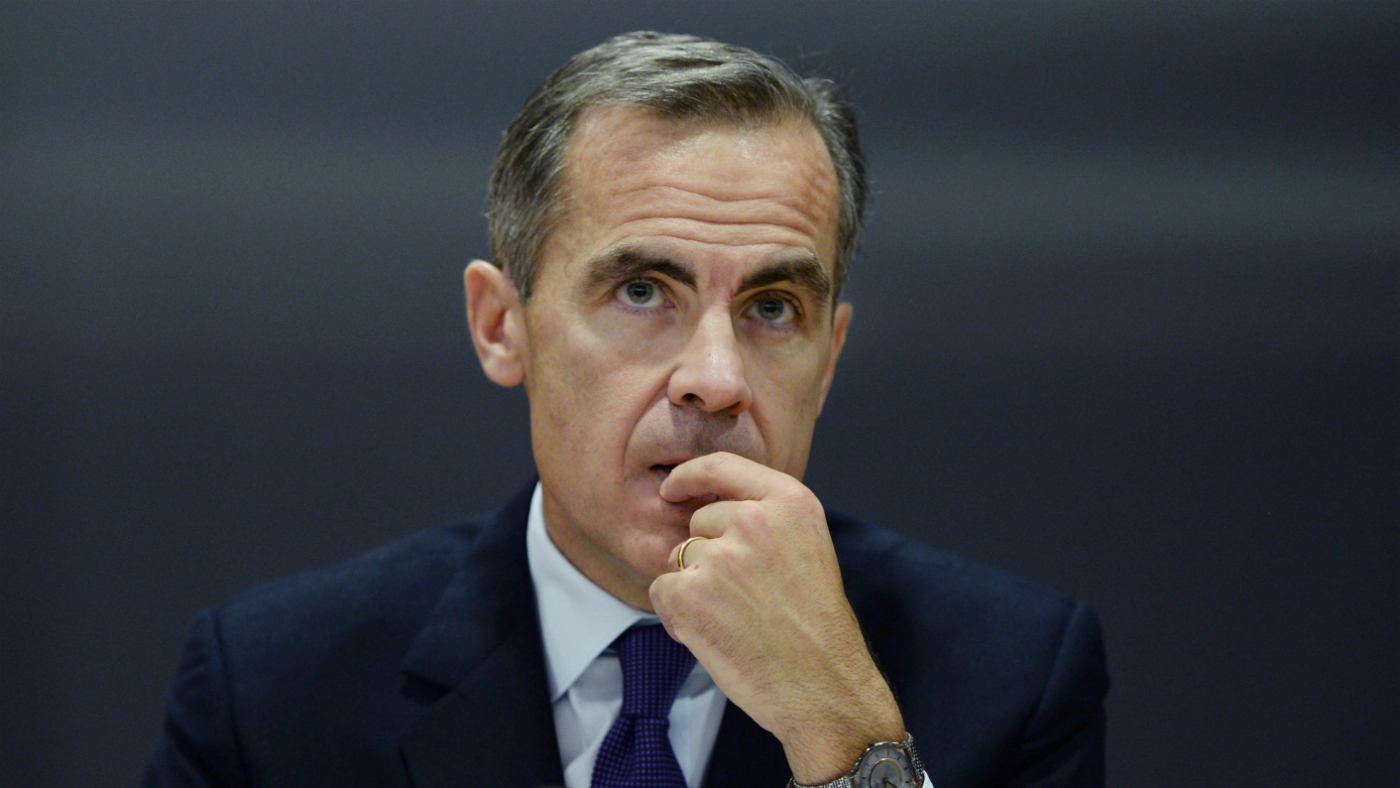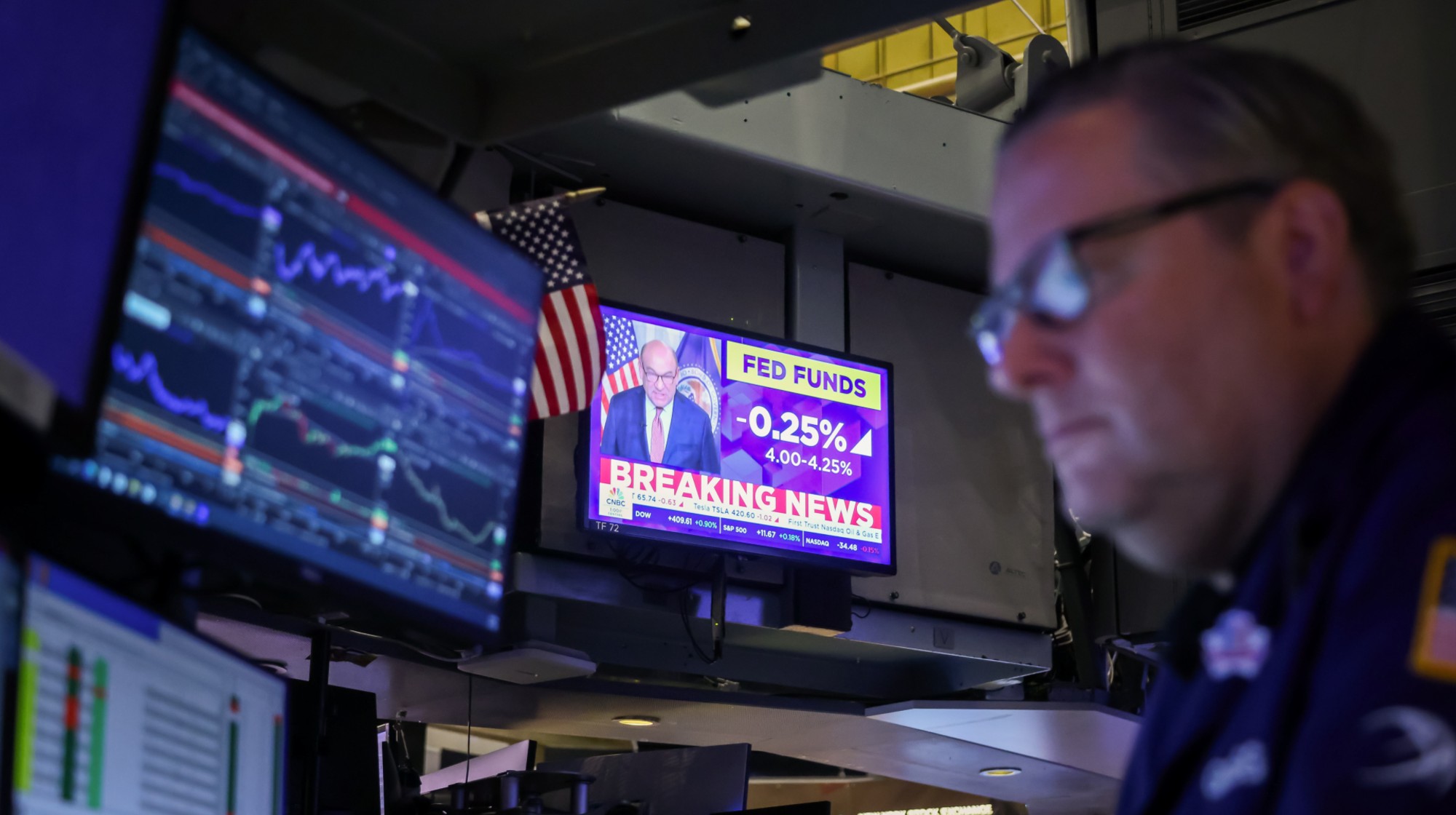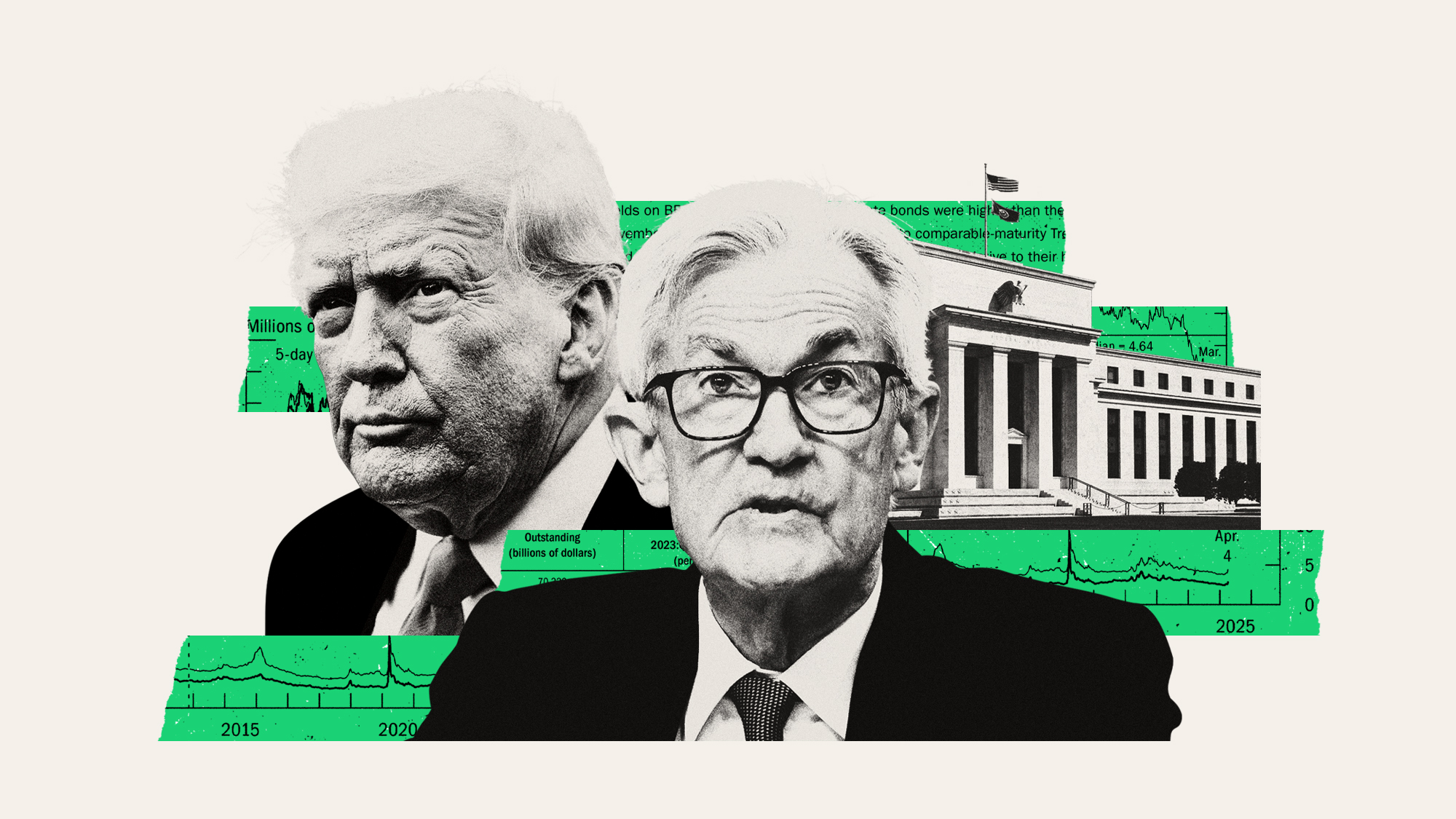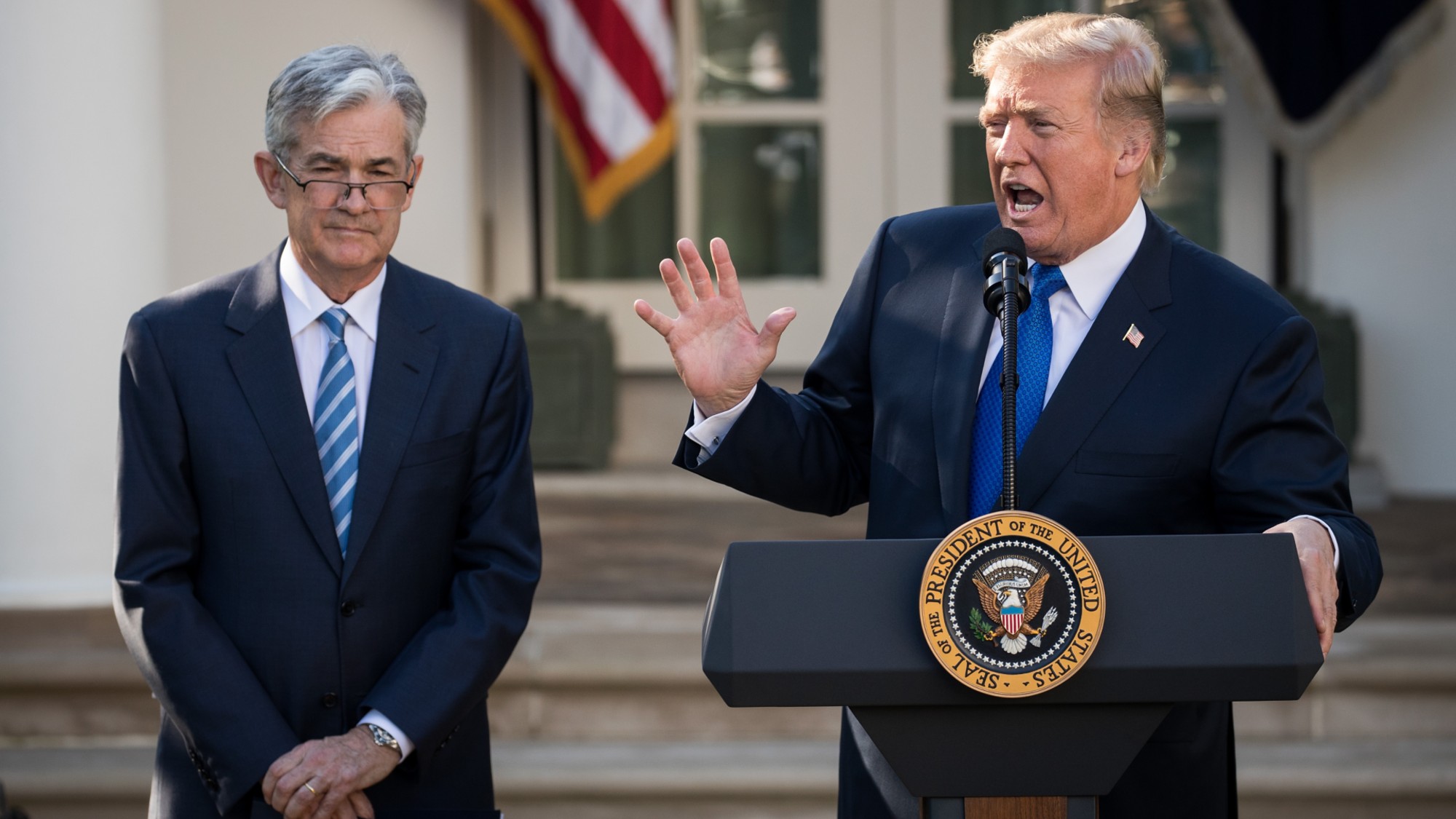Pound plunges after Bank of England's dovish rates signal
Central bank revises its growth forecast for UK economy

A free daily email with the biggest news stories of the day – and the best features from TheWeek.com
You are now subscribed
Your newsletter sign-up was successful
Interest rates: three reasons they should rise this week
14 December
Investors are convinced the Fed will hike this time.
Since the summer there has been endless speculation over when the Federal Reserve will set ultra-low interest rates back on a path to normality.
The Week
Escape your echo chamber. Get the facts behind the news, plus analysis from multiple perspectives.

Sign up for The Week's Free Newsletters
From our morning news briefing to a weekly Good News Newsletter, get the best of The Week delivered directly to your inbox.
From our morning news briefing to a weekly Good News Newsletter, get the best of The Week delivered directly to your inbox.
Now close to 80 per cent are betting the decision on Wednesday will be a 0.25 per cent increase – and The Times notes that if "account was taken of expectations of rates rising by any amount", the odds of a raise are priced near 100 per cent.
So why are traders so confident the Fed's rate-setting committee will act?
Risks are reduced
Most of the arguments against a rates rise are that the risks outweigh the benefits of normalisation - but Roger Bootle writes in the Daily Telegraph that most of those risks are now diminished.
A free daily email with the biggest news stories of the day – and the best features from TheWeek.com
In particular, he says the impact on overseas trade of the inevitable rise in the dollar is overstated. Bottle says emerging markets are less exposed to the US currency so a small rise will have minimal effect, and the housing market is insulated through the preponderance of long-term fixed rate mortgages in the US.
Economic data is positive
On the other hand, key economic indicators speak to an economy in rude health – and Peter Spence writes in the Daily Telegraph there have been a "string of positive surprises in the latter half of this year".
The US jobless count is at a near-40-year low, retail sales are up and growth appears entrenched. Even inflation, held back by weak oil prices, is near two per cent once volatile energy and food costs are stripped out.
It'd be chaos if it didn't rise
Just look at that big bet on a rise. In fact The Times says this is "so firmly baked into investor sentiment that there is virtually no way to pull the markets back without a major disruption".
Euan Harkness, a managing director at Barclays and the chairman of the Gilt-Edged Market Makers’ Association, said another hold would send a "signal that central banks are paralysed".
So what if it did rise?
This is now the key question – what will happen when the Fed does raise rates? First is the question of the path of increases.
A poll of 51 economists by the Financial Times produced a median estimate of a cumulative 1.75 per cent over two years, indicating slow and gradual normalisation. Bootle reckons the pace might double from there if inflation picks up.
He readily admits that this will cause "casualties" - specifically "people, institutions, and transactions that depend on ultra-low interest rates to keep going". This, though, is all part of the process of healing from the recession and "is not a case for inaction".
As for markets, the reaction is unknown. As Spence points out, many people now working in the world's financial hubs have never seen interest rates rise and around a third have spent their entire careers with rates at current record lows. The period following the first rate rise could be "turbulent".
Interest rates: five things we learned from latest BoE hold
10 December
Bank of England's rate setters have voted to keep rates on hold in December, meaning the record low base rate of 0.5 per cent will persist into 2016.
This had been universally expected, but with some analysts saying a hike could arrive just two meetings hence in February, the minutes published alongside the decision were being pored over for signs of a shift in sentiment.
Here are five things we learned from the latest Bank missives.
1. Inflation is expected to stay low
Energy costs have been the key drag on consumer prices in the past year. Oil has crashed again this week and Brent crude was heading back below $40 a barrel at the time of writing.
This undermines the argument that inflation would begin to rise in January as the annual comparison reflects a new normal around $45, first hit in January of this year. Some are now talking about $20 a barrel by March.
2. Wages might be tailing off
Another factor that could hold down inflation for longer is wages. They're rising fairly strongly compared to the past few years, but at three per cent average pay growth is below the long-run average and it barely moved last month.
There even be a cyclical effect between wages and inflation, whereby low headline price rises are giving cover for employers to offer more measly increases.
3. Dovish tone
Inflation remaining low keeps the pressure off the bank to increase rates - and the Financial Times notes the committee was also worried about what will happen if the Federal Reserve, as expected, increases US rates this month.
"It remains to be seen what impact, if any, such a rise might have on financial conditions, including in expectations of communications about the future path of policy."
4. No movement
All of which combined to mean there was no movement in the composition of the vote, with Ian McCafferty the only hawk against eight members voting for rates to remain on hold.
Traders sense we're some way off a rise yet, and the pound has fallen slightly in the aftermath of the minutes being published, by 0.2 per cent against the dollar.
5. Economic boost
Among the more positive elements cited by the committee is the forecast for economic growth next year, which they said would be slightly higher in the wake of a less painful Autumn Statement.
Overall the committee reckons on a "modest boost" of 0.2 per cent. It continued to stress that cutbacks in spending would weigh on growth over the coming years.
Interest rates: will UK base rate rise in two months?
09 December
A think tank has forecast that growth in the UK economy is picking up momentum and has predicted an interest rate rise in February, far earlier than expected.
City AM says the National Institute of Economic and Social Research has put growth for the three months to November at 0.6 per cent, slightly more than the 0.5 per cent for the three months ending October and a continued improvement from the summer lull.
"This rate of growth is consistent with the continued absorption of spare capacity in the UK economy," said City AM.
While most economists have a rate rise pencilled in for later in the year, perhaps at the beginning of the summer, and markets are predicting a hike in the latter part of 2016, there are reasons to suggest this more hawkish forecast might yet prove correct.
Not least among these is the fact that the US Federal Reserve might hike its rates next week, which could embolden the Bank of England if adverse effects are limited
Even among those who agree that there is little inflationary pressure to drive interest rates higher and that there are risks to rising, there is a growing sense that the distortions to markets starved of yield for so long are now making a compelling case to move sooner rather than later.
It is this effect that is blamed for the property market boom that some claim is now a bubble.
"Although the Bank has other instruments at its disposal, the most important restraining influence on the overall state of the housing market is going to come from interest rates... It won’t be this Thursday, but it won’t be that far into the new year before UK interest rates should start to rise," Roger Bootle, chairman of Capital Economics, writes in the Daily Telegraph.
There could yet be a fly in the ointment, in the form of oil prices. It had been assumed that with the international benchmark, Brent, stable at around $45 a barrel, the level hit in January 2015, the annual comparison that establishes the rate of inflation would no longer show a big energy price drag.
Price rises were set to snap back from zero to one per cent – and with wages rising pushing on towards the target of two per cent.
But the oil price has crashed again, dipping below $40 a barrel yesterday. It's recovered some of that ground today, but some predictions suggest it could yet fall much further before reaching a final bottom – and that would hold inflation down for longer and give the Bank more breathing room.
Interest rates: Fed 'playing Russian roulette with a bullet in each chamber'
4 December
An interest rate rise in the US in two weeks' is now all but guaranteed, says the Telegraph, after a report revealed another impressive month for the US jobs market.
One analyst, David Lamb, head of dealing at the foreign exchange firm FEXCO, said the Fed plays Russian roulette with rates at each meeting – but this month it will be "playing with a bullet in each chamber". He added the rate-setting committee is "running out of reasons not to raise rates this month".
The confident commentary came after the latest non-farms payroll report from the Labour Department. It showed the US economy added 211,000 jobs in November, more than was expected and above the 200,000 threshold associated with healthy growth, and upgraded the already stellar October number from 271,000 to 298,000.
The Fed had made the jobs market the key focus of its decision on whether to raise rates this month - and meet its prediction in the summer that it would take the first step of policy normalisation before the end of the year. Failure to increase now could have severe consequences, as traders are heavily invested in what is seen as a sure thing.
Ian Shepherdson of Pantheon Macroeconomics told the FT the report meant it was "job done" on a rise. "If the Fed now doesn't hike… the market reaction will make yesterday's chaos post-ECB look like a non-event."
Shepherdson was referring to the latest European Central Bank Stimulus package yesterday, which was far more understated than many had anticipated. Having talked up the support that would be offered, markets had traded the euro down to a seven-month low against the dollar and backed exporter equities.
In the aftermath of the decision, the euro jumped 3.5 per cent, while all of the main continental equity indices shed in excess of three per cent. US and Asian equity markets followed suit and lost on average between 1.5 and two per cent.
Interest rates: ECB and Fed go their separate ways
3 December
Divergence in central bank policy, which began in Europe today and could be confirmed by the Federal Reserve in two weeks' time, is driving intense volatility on markets.
Traders had been betting on a big injection of stimulus from the European Central Bank and tightening of policy on the other side of the Atlantic. The euro has been diving, the dollar surging, equities in Europe on the up and commodities hitting fresh lows.
Then this afternoon a strange thing happened. The Financial Times erroneously published a pre-prepared story saying the ECB had defied the doves and held the bank deposit rate – the already negative interest rate for banks to hold cash with the central bank – and the euro jumped. The story was corrected… and the euro surged higher still, while equities have tumbled sharply.
It seems the stimulus offered, comprising of a cut of 0.1 per cent in the deposit rate to -0.3 per cent and an extension of its bond-buying programme to at least 2017, was less than had been expected. After falling to a seven-month low against the dollar in the previous session, the euro has leapt two per cent. The FTSE Eurofirst-300 equities index has slumped 2.4 per cent and oil has risen 1.7 per cent from its latest six-year low.
Markets will calm once the positions adopted on the back of predictions of stronger intervention are unwound, but it shows the level to which markets are counting on central bank support in Europe. The contrast with rate-setters' thinking in the US could not be starker.
Janet Yellen affirmed during a speech yesterday that the Fed is poised to increase rates for the first time in a decade later this month, the Wall Street Journal notes. A private sector jobs report yesterday was solid and Labor Department data showed wages growing at an impressive 3.4 per cent. Unemployment claims remained at a healthy sub-300,000 level for the 39th consecutive week last week.
Unless there are any surprises the market is banking on a hike.
Underneath this divergence the economic situation in the two areas is not so very different. The eurozone is also recording decent retail sales, has an expanding manufacturing sector and has a strong and growing employment rate. In some respects the ECB and the single currency bloc is merely behind the curve – while the Fed is about to begin leading the way back to 'normal' monetary policy.
-
 Sepsis ‘breakthrough’: the world’s first targeted treatment?
Sepsis ‘breakthrough’: the world’s first targeted treatment?The Explainer New drug could reverse effects of sepsis, rather than trying to treat infection with antibiotics
-
 James Van Der Beek obituary: fresh-faced Dawson’s Creek star
James Van Der Beek obituary: fresh-faced Dawson’s Creek starIn The Spotlight Van Der Beek fronted one of the most successful teen dramas of the 90s – but his Dawson fame proved a double-edged sword
-
 Is Andrew’s arrest the end for the monarchy?
Is Andrew’s arrest the end for the monarchy?Today's Big Question The King has distanced the Royal Family from his disgraced brother but a ‘fit of revolutionary disgust’ could still wipe them out
-
 Powell: The Fed’s last hope?
Powell: The Fed’s last hope?Feature Federal Reserve Chairman Jerome Powell fights back against President Trump's claims
-
 The end for central bank independence?
The end for central bank independence?The Explainer Trump’s war on the US Federal Reserve comes at a moment of global weakening in central bank authority
-
 Who will be the next Fed chair?
Who will be the next Fed chair?Today's Big Question Kevin Hassett appears to be Trump’s pick
-
 Should Labour break manifesto pledge and raise taxes?
Should Labour break manifesto pledge and raise taxes?Today's Big Question There are ‘powerful’ fiscal arguments for an income tax rise but it could mean ‘game over’ for the government
-
 What are stablecoins, and why is the government so interested in them?
What are stablecoins, and why is the government so interested in them?The Explainer With the government backing calls for the regulation of certain cryptocurrencies, are stablecoins the future?
-
 Fed cuts interest rates a quarter point
Fed cuts interest rates a quarter pointSpeed Read ‘The cut suggests a broader shift toward concern about cracks forming in the job market’
-
 Trump's threats to fire Jerome Powell are unsettling the markets
Trump's threats to fire Jerome Powell are unsettling the marketsTalking Points Expect a 'period of volatility' if he follows through
-
 How will Wall Street react to the Trump-Powell showdown?
How will Wall Street react to the Trump-Powell showdown?Today's Big Question 'Market turmoil' seems likely